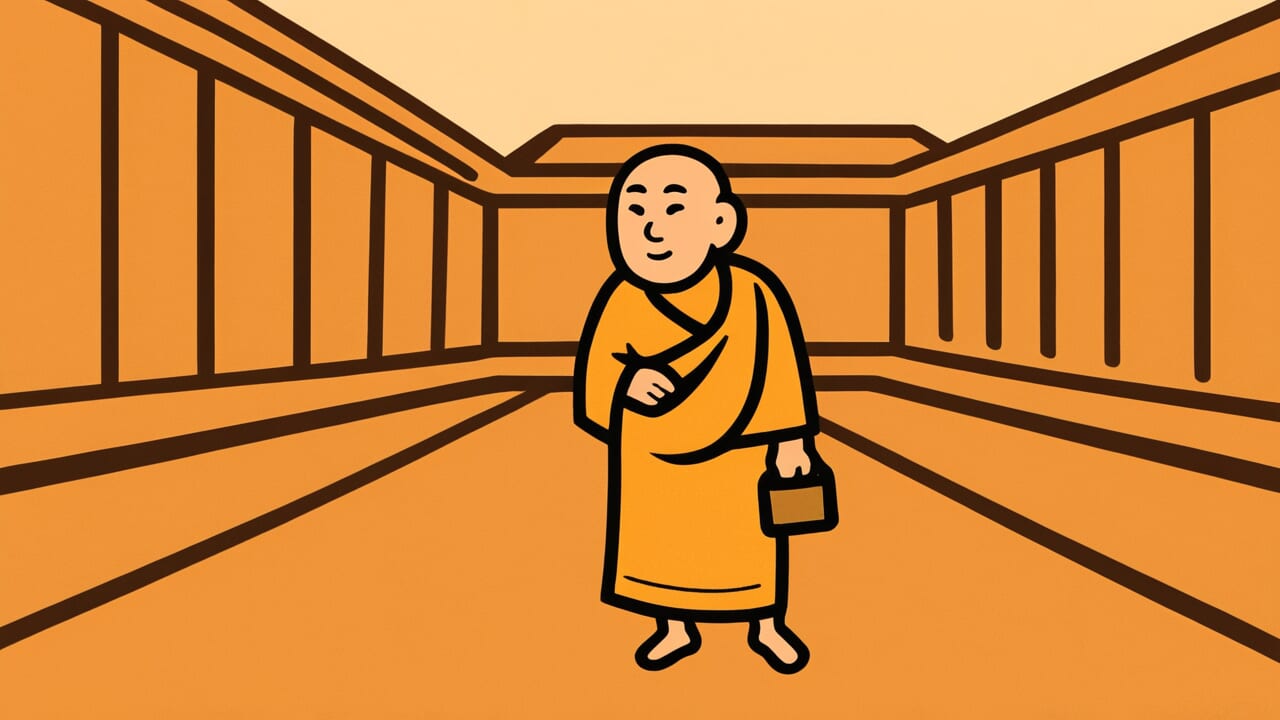How to Read “Even to become an elder, one must pass through being a novice”
Chōrō ni naru mo shami wo heru
Meaning of “Even to become an elder, one must pass through being a novice”
This proverb expresses a fundamental truth. No matter how high someone rises, they always started by learning the basics.
Everyone begins as a beginner. They reach their current position through steady, step-by-step progress.
In modern society, we often forget this when we see successful people. We look at those in positions of authority and overlook their beginner days.
But the reality is different. These people also learned fundamentals, made mistakes, and worked hard over time.
This proverb reminds us of this obvious but easily forgotten fact.
The saying also serves as a warning to those in high positions. Even if you now teach others, you were once taught yourself.
You should maintain humility and remember your origins. It warns against looking down on basics or dismissing beginners.
Origin and Etymology
This proverb likely comes from Buddhist terminology describing stages of monk training. “Elder” refers to a high-ranking monk who has trained for many years and reached an advanced spiritual state.
“Novice” refers to an apprentice monk before formal ordination. This is someone who has just begun learning Buddhist precepts as a complete beginner.
In the Buddhist world, every monk in a high position has experienced the novice stage. No one skips this foundation and jumps straight to elder status.
It takes years or even decades to grow through each stage, one step at a time.
The proverb emerged from Japanese Buddhist culture’s emphasis on training. During the Edo period, temple schools and samurai training also valued starting with basics.
In every field, people respected the attitude of learning steadily from the first step.
Though using Buddhist terms, this proverb applies beyond the monastery. It teaches about learning attitudes throughout all of life.
The message is clear. No matter how high your position or honor, never forget that everyone experienced being a beginner and built up from fundamentals.
Interesting Facts
The word “shami” (novice) comes from the Sanskrit word “shramanera.” Buddhism brought this term to Japan through China.
During the novice stage, monks follow ten basic precepts. They learn how to read sutras and master fundamental rituals.
Buddhist training has clear stages. After novice comes other levels, eventually reaching “bhikkhu” (fully ordained monk).
Becoming an elder typically required several decades of training.
Usage Examples
- Even now as company president, what I learned in new employee training still helps me. “Even to become an elder, one must pass through being a novice” is true—fundamentals really matter
- She’s now the industry’s top expert, but apparently she was worse than anyone at first. “Even to become an elder, one must pass through being a novice” applies to every master
Universal Wisdom
Humans tend to see successful people and assume they were always talented. But actually, every great person experienced being a beginner.
This proverb teaches us a universal truth about human growth.
Why did our ancestors leave this teaching? They understood human weakness. When people gain status or power, they easily forget their origins.
Success makes us beautify or completely forget past struggles and failures. We become harsh toward beginners or dismissive of fundamentals.
This proverb has endured because it contains essential insight. It’s not just encouragement—it reveals truth about growth and humility.
In any field, you cannot master advanced skills without basics. No matter how high you climb, your foundation came from elementary learning.
Humans are forgetful creatures. That’s why we need words like these to remind us repeatedly.
Your current position stands on countless small steps accumulated over time. And those who are beginners today will someday grow the same way.
This gives us both humility and hope.
When AI Hears This
Looking at biological development, human embryos pass through fish-like gill structures. They go through amphibian-like stages before finally taking mammalian form.
It’s like replaying evolutionary history at high speed. What’s interesting is that you absolutely cannot skip stages. You cannot jump directly to the finished form.
This proverb’s truth—that elders must start as novices—has exactly the same structure. Building complex systems of mastery requires starting from simple stages.
Why? Because later complex abilities are built on neural circuits and cognitive patterns formed in early stages.
For example, professional shogi players all start with learning how pieces move. The basic pattern recognition formed at this stage becomes the foundation for advanced strategic thinking.
If you try to skip basics and learn only applications, it collapses like a building without foundation.
Biology has a concept called “scaffolding theory.” Complex structures can only be built using simpler structures as scaffolding.
Neither evolution nor learning can escape this law. An elder’s wisdom can only exist on the foundation of novice experience.
This isn’t wasted time. It’s a physical necessity for complex systems to advance.
Lessons for Today
This proverb teaches you the importance of progressing step by step without rushing. When you see only others’ success on social media, you might feel left behind.
But those people also started from basics. You just don’t see that part.
The fundamentals you’re learning now are never wasted. Rather, they become the most important foundation supporting your future self.
Practice that feels boring and assignments that seem too easy all have meaning.
If you already have experience in some field, this proverb means something else. Remember yourself as a beginner.
Don’t forget that humility. Don’t look down on people learning basics now. You can watch them warmly, as if seeing your former self.
Life has no shortcuts. But that’s not sad—it’s actually hopeful.
Because everyone walks the same path, you will definitely grow too. Today’s single step is creating tomorrow’s you.



Comments